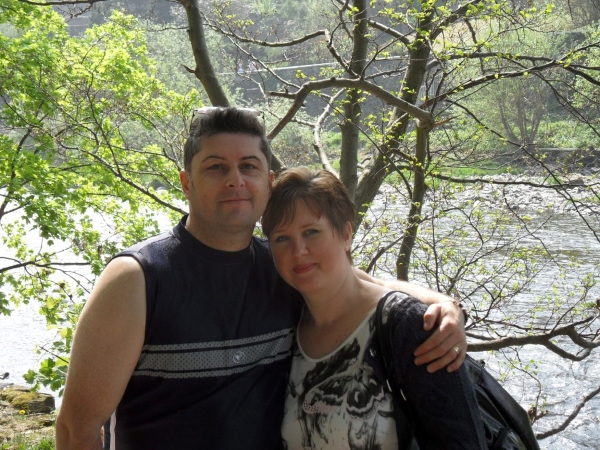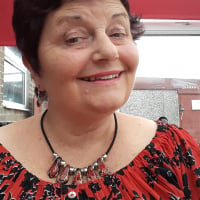How do you stay positive as a disabled carer?

I'm Victoria
Lewin, Author, Speaker, Young Carers and Disability Awareness Campaigner. I've
been my husband's Carer since 2003 and I have Ehlers-Danlos Syndrome (EDS) and
Fibromyalgia.
“I don’t know how you cope!”
“I couldn’t do it!”
“How do you stay so positive?”
If I had a pound for every time I’ve heard these phases I’d be rich now.
My journey of becoming a carer overnight
In truth, I have a myriad of ways I cope which depending on what the day brings. With my husband’s brain illness and brain injury I never know what the day will be like. A seemingly ‘good day’ can turn into a bad one within minutes. Yet I’m so used to dealing with it now, it’s become my norm.
Our children were only five and two years old when he became poorly back in 2002, so they grew up being young carers. Nowadays we share the caring role between my daughter, her fiancé and myself.

However, I’m disabled and so is my daughter. We’ve never had good health, before finally being diagnosed with Ehlers-Danlos Syndrome in 2016, just before my 43rd birthday! In fact, that’s what I’ve always found ironic, my husband was never ill. Never! That’s why it was a real shock to the system when he started with this rare incurable brain illness. How could this be happening? I was the one who had poor health, not him! But this was really happening and overnight I became his carer, at 29 years of age.
Juggling being a carer and staying positive
I became both mum and dad to the children, doing my best to be everything to everyone. This led to me ignoring my own health to a great extent, after all I couldn’t be ill, could I? My family needed me! Maybe if I’d had the diagnosis of EDS back then I’d have taken my health more seriously, but I didn’t know. Eventually my body couldn’t take anymore of me ‘pushing through’ and I became completely disabled by my EDS in 2014. Since then my life has become about balancing my needs with my husband’s needs and learning to say no to people, which isn’t easy when you’ve always been a people pleaser.
In answer to the question ‘How do you stay so positive?’ there are lots of little things we need to do each day. You can’t go from feeling sad and angry to positive just by telling yourself to be positive. It’s much more complicated than that and it’s a gradual process. Firstly, it’s vital that we are kind to ourselves. As carers, that’s easier said than done. All too often we give every ounce of energy to those we care for, leaving precious little for ourselves. Trying to be everything to everyone takes a massive toll on you, both physically and emotionally.
So, how do we get the balance right?
The changes I have made in my life
By making lots of small changes in the way you perceive your life.
Start with appreciation. When we give gratitude either mentally or verbally it creates a vast shift in our perception of life. If you’re struggling to do this, try listing 3 things you’re grateful for each day. You could even think about it as you brush your teeth in a morning. Keep it simple to begin with. If you’re worried about something, redirect your focus to what is working in your life, instead of what isn’t. Whenever I focus on the positives in my life it makes it easier to cope with the negatives.

I rest whenever possible, even if it’s in short bursts, I always put my feet up and put my heat pad on if I can. I sleep as much as possible too, it allows your body to re-charge ready for the next day. It sounds so obvious, but I never respected sleep before I became disabled, and I think that’s true for many carers. We soldier on with little or no sleep, running on empty, when it’s vital to our wellbeing.
The final change I made was meditation. It’s been life changing for me, and I never thought it would help. I also listen to Gabby Bernstein’s spiritual podcasts and read her books.
If you want to follow Victoria’s journey, then you can read her blog. You also can buy her book, ‘Happiness; How to be happier, no matter what’ by Victoria Lewin
So, what small change do you think you can make today to look after yourself? Are there three things you are grateful for? Let us know in the comments below!
Comments
-
I like crafting, but can overdo how much time I spend on a project. When It`s going well, I push myself and then can hardly move at times!
This morning was a great example of just that.
I shopped for a new project yesterday and wanted to get on with it.
I watch tutorials on YouTube....rag quilting...a cheat`s quilt.....instead of cutting out squares or whatever shapes you do, just sew channels, cut them open and snip them.
The effect is a fluffy cover! Because of my MS I am immobile and cant get on the floor, or hold the fabric out as much as it needs. Today I only had my carer for 1.25 hours, so asked hubby to help. He never likes to get involved with my crafts, as he has plenty to do looking after me, shopping etc and then finding a bit of time for himself.
He could see how I was struggling to fold my sheets, so he did help. Good lad!
Then I got on with channelling and cutting....I pinned, sewed, folded....till my left hand couldn't even pick a pin up. I tried to open a drawer to get a ruler....pulled it out too far and it fell to the floor...spilling it`s contents. I couldn't pick anything up,,,,my hand wouldn't grip my grabber well enough.
So I`ve retired to my recliner chair.......another day tomorrow!
Well done to you Victoria. Being a carer is the most valued yet undervalued job ever!
best wishes to you and your family.
love Pollyxxx
2 -
@VictoriaLewin
Im not my dads Carer but see my mother doing everything for my dad and we from time to time take over to give her a bit of relief and time to herself.
Looking after my dad who has epilepsy, angina, PTSD and Asthma recently had a stroke (TIA) which thank god wasn’t as bad but still bad enough as it’s made my mothers work harder.
I think that’s the best way - to give the Carer a bit of time off just to recuperate and have a bit of time away.
My dad hates it sometimes -bless him, cause he knows how much my mother does for him.
I guess people cope in different ways..?0 -
Hi @pollyanna1052 ,
Thanks so much for your reply, it was lovely to hear from you. ( Sorry it's taken me so long to reply to you. )
Your hobby sounds fantastic. I've always admired people who can create such masterpieces. It sounds very complicated, but lots of fun. I can relate to what you are saying a little bit. I used to do embroidery as a hobby but about 7 years ago my hands became so painful that it was impossible to do it anymore. It was then I decided to focus solely on my writing and dedicate my energy to doing that. I have an enormous keyboard that's for the visually impaired but with the keys being so big it makes it easier for me to type and my hands don't hurt as much.
It's all about finding the balance I suppose, isn't it? Knowing when to stop and listen to our bodies. My recliner is my best friend a lot of the time, and like you said tomorrow is another day. I often think like that. We have to do don't we?
Sending lots of love and hugs to you and your family,
Love
Victoria xxx
0 -
Thankyou Victoria. Your keyboard sounds ace.
Pollsx
1 -
Hi @Jay1969
you're absolutely right. Getting respite breaks even just for an hour or two are crucial to a carer's well being. We're lucky that my husband's friends take him out regularly to give us a break. It sounds like you're a fantastic support network for your Mum. xxx
0 -
It really is Polly. Makes typing so easy. xxx0
Categories
- All Categories
- 15.7K Start here and say hello!
- 7.5K Coffee lounge
- 105 Games den
- 1.7K People power
- 155 Announcements and information
- 25.1K Talk about life
- 6.2K Everyday life
- 505 Current affairs
- 2.5K Families and carers
- 895 Education and skills
- 2K Work
- 574 Money and bills
- 3.7K Housing and independent living
- 1.1K Transport and travel
- 641 Relationships
- 1.6K Mental health and wellbeing
- 2.5K Talk about your impairment
- 878 Rare, invisible, and undiagnosed conditions
- 936 Neurological impairments and pain
- 2.2K Cerebral Palsy Network
- 1.2K Autism and neurodiversity
- 40.5K Talk about your benefits
- 6.1K Employment and Support Allowance (ESA)
- 20.2K PIP, DLA, ADP and AA
- 9K Universal Credit (UC)
- 5.3K Benefits and income

